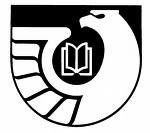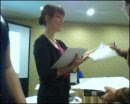Thursday, January 15, 2009
New Site for Federal Agencies
Recently, the LSU Libraries' web pages were revamped; and the government agency site got a new look. Check it out and marvel at the creative handiwork of LSU Reference Department's Angela VandenBroek.
http://www.lib.lsu.edu/gov/index.html
Presentations for LLA in March
If your presentation can be distilled into an article and offers new ideas or insights, it can get you a "two-fer." You can put both the presentation on your vita and the article about it!
Wednesday, January 7, 2009
Thanks!
Because some of you were not able to attend the most recent meeting of the Louisiana Federal Depository Library Council held on November 14 at the State Library, you did not already have a chance to make comments on my announcement of the proposed move of selected older federal documents from New Orleans Public to Tulane.
This plan is a natural and logical response to the damage sustained during Hurricane Katrina in 2005. As you remember, Tulane’s basement was flooded—causing great loss to their federal gov docs collection; and New Orleans Public’s basement was not flooded—thankfully saving many volumes of “heritage-quality” federal gov docs.
However, while damage to the materials was not a problem at NOPL post-Katrina, other negative impacts were felt, primarily in staffing numbers. This staffing issue brought to light the fact that while NOPL had a wonderful heritage collection of fed docs, the patron needs had changed at NOPL, making this collection under-utilized. Simply put, these older, currently unused, documents were needed to help rebuild a docs collection in a location where the documents would more likely be used.
As soon as I got to Louisiana and was asked if the NOPL docs could be moved to Tulane, I was in support of what seemed like a perfect solution; and now it appears that the two libraries in question are ready to move forward. Before they are given the 100% go-ahead, it was suggested to me by GPO that I make sure that none of the other selectives had a problem with this plan. Since, as I noted above, I had already announced it at the meeting in November, I decided to send this message out to make sure that everyone had a chance to come forward with comments or concerns.
Please send comments to me directly, off-list, so that we do not get one of those torturous threads going that are difficult to follow.
Monday, November 17, 2008
The Most Recent Version of Appendix 5 to the State Plan: Discard Instructions
Thanks and Happy New Year!
APPENDIX 5
DISCARD INSTRUCTIONS
Guidelines for Discarding Government Documents
These guidelines are based on the online Federal Depository Library Handbook at http://www.fdlp.gov/handbook/index.html. Documents received through the Federal Depository Library Program belong to the federal government. A selective library must obtain permission from its primary regional library to discard depository material.
Items listed on a discard list must have been received in the depository library five or more years prior to the date of the discard request. Superseded items included on discard lists at the request of Louisiana’s Regional Depositories are an exception to the five-year rule. Selective libraries wishing to withdraw documents should consult the Federal Depository Library Handbook for general rules on how to treat withdrawn material. It should be noted that no library is required to discard any depository library materials.
Procedure:
1. Create a list of materials to be discarded:
Superseded materials should be on a separate list from regular discards.
Include all contact information on the list such as: library name, depository library number, e-mail address, and contact person.
List call numbers in SUDOC order.
Separate call numbers by format: Paper, electronic, microfiche, etc.
List the complete title of each publication
Indicate if the document is bound.
Serials should include the series title and holdings (vol., no., years)
If the material is in poor condition, please note this information.
In general practice, libraries are not required to list superseded materials but are encouraged to offer historical or significant materials. However, Louisiana Regionals have made certain exceptions to this policy/procedure, as follows:
Call numbers that have an “R” in the right hand column (refer to “Superseded List 2002” at http://www.access.gpo.gov/su_docs/fdlp/pubs/suplist/index.html). The “R” indicates that Regional Libraries must retain these titles.
All “general publication” titles, such as: A 1.2:, HE 20.4002:, I 19.2:, T 22.2:, etc.
Titles that LATECH and LSU agreed to retain from the 1991 publication “Regional Libraries Superseded Decisions, 1989-1991.”
Other titles that the Regional Libraries have decided to retain. (Selective Libraries will receive a list of any titles that Regional Libraries retain based on local retention policy decisions. This list will be modified semi-annually, if needed).
Note: If a library supplements or replaces depository material by purchasing the same title in another format, e.g., microform or CD-ROM, the depository items cannot be bartered or exchanged and must be offered to the regional library if the purchasing library wishes to dispose of them. Under these circumstances, the discarding library does not need to adhere to the five-year retention period but may offer the depository items at the time of replacement.
2. Copies of the list should be sent, simultaneously to each of the regional libraries, indicating a deadline of three weeks. E-mail is the preferred method. All documents must be held until both regionals have responded to the discarding selective depository.
LSU Libraries
Middleton Library
Government Documents Dept., Room 53
Baton Rouge, LA 70803
Stephanie Braunstein
sbraunst@lsu.edu
and Doris Hutson
dchutso@lsu.edu
225-578-7021
Fax: 225-578-6535
Louisiana Tech University, Prescott Memorial Library
Government Documents Department
Everett Street at the Columns
P.O. Box 10408
Ruston, LA 71272
Rita Franks
rfranks@latech.edu
318-257-4989
Fax: 318-257-2579
3. Within a few days of receiving the request, the regionals will each send an e-mail response to let the selective know that the list has been received.
4. Both regionals review the discard list to ensure that nothing is being offered that shouldn’t be and to determine if any of the materials are needed in the regional’s collection. Prior to the deadline, the primary regional will send an e-mail to the selective granting permission to withdraw the items and both regionals will request any items needed from the list. If a regional is not able to complete this within the three week deadline, it will contact the selective library and give a new deadline date.
The regional libraries have priority for all documents offered on any discard list. If both regional libraries request the same document, that document should be sent to the disposing library’s primary regional (see Appendix 4).
5. After receiving permission to discard items, the selective library will edit the Discard List to delete any items requested by the regionals and post this revised list to the Louisiana government documents listserv, Bayoudoc. Materials must be made available for a minimum of three weeks to allow other selective libraries sufficient time to request materials.
Note that any items from Superseded Lists that are NOT requested by either regional can be discarded immediately and do not need to be included in the revised list as sent to Bayoudoc.
Selective libraries receiving items from the list will be responsible for shipping costs. All libraries are encouraged to use the state courier service.
Remaining items of historical or significant nature should be offered through the National Needs and Offers List at http://www.access.gpo.gov/su_docs/fdlp/tools/needs_of/index.html and/or on GOVDOC-L.
6. After all reasonable efforts have been made to transfer the publications to other libraries, the depository library is authorized to dispose of the remaining items by means of any of the following:
a. Offer historical or significant sets to the U.S. Government Printing Office for digitization or housing in its dark or light archives;
b. Offer to other educational institutions;
c. Offer to private citizens;
d. Donate as paper to recyclers or paper drives;
e. Sell, either as secondhand book or waste paper. All depository publications remain the property of the U.S. Government. Therefore, the proceeds from the sale of any items, accompanied by a letter of explanation, should be sent to the Superintendent of Documents, U.S. Government Printing Office, Washington, D.C. 20402.
f. Destroy
Tuesday, November 11, 2008
It's Been a Long, Long While . . . .

The above photo shows the equipment and method used to scan a copy of the United States Serial Set. The most interesting aspect of this process is the use of a tiny vacuum arm that gently lifts each page onto the scanning screen--keeping the fragile book from being harmed.
Sunday, September 7, 2008
Post-Gustav Concerns & Ruminations
Seriously, however, I want to begin this post by saying that if any of LSU's Selectives need assistance after the hurricane, please let me know as soon as possible. I will be back at the Library tomorrow to survey whatever damage we have sustained (so far, I'm told that windows on the 4th floor were blown out--but no word yet on how our basement fared; I may need a boat to navigate to my office), so call or email me then to let me know how you are all doing.
On the homefront: my house was temporarily barricaded by a small forest of downed trees; but, thank heaven, none of them actually crashed into the structure itself. Others in my neighborhood were not so lucky.
Comparing the bad to the good about this (or any other) hurricane (my first, ever), one can go on for days about the bad--destruction, mess, no utilities (heat, darkness, no way to cook a meal, food spoiled, etc.); but the good is perhaps a bit more subtle and more individual. The good things include the awareness that folks are eager to help one another out in ways above and beyond the call of duty; the knowledge that you can exist without electricity (not comfortably, of course, but exist you will), this includes the realization that low-tech things like candles and kerosene lamps are still vital (I was grateful for my early hippie back-to-the-land days when I learned to appreciate these simple resources); and the opportunity to rid oneself of things like "phantom food"--the stuff that has collected in the back of the fridge, not really edible still but not quite yet garbage--it all gets thrown away with a sense of relief. That refrigerator has not been this clean since the day it was delivered; even the floor in front of it is spotless--lots of leaking water made that possible.
I could go on, but I'm feeling the urge to get out in the yard and continue the clean-up there. Once again, if you have any needs that can be addressed by us here at LSU, please contact me. If I can get things worked out, I may plan a tour of local Selectives as soon as possible.
Stephanie
Wednesday, August 6, 2008
Display at Vernon Parish Library

The photos in this display are taken from the 2007 Highlights of Louisiana Agriculture--a State of Louisiana document published by LSU's Ag Center.
If you have any photos of special displays you have done with docs (fed or state), send them to me; so I can publish on this blog.
















